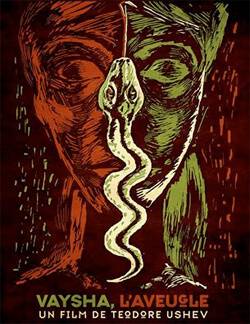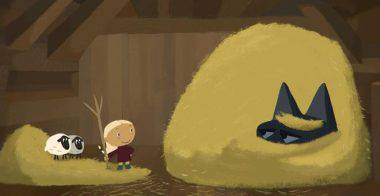Annecy 2016: Short Films in Competition 2
Day one at Annecy was superb, even the rain couldn’t dampen our spirits as we were treated to another strong selection of Short Films in Competition. As well as that we had the pleasure of attending the screening of Michael Dudok de Wits much anticipated feature debut, The Red Turtle.
Introduced by the director himself he relayed the story of how the relationship with Studio Ghibli came to be and when the studio contacted him telling him how “Japanese” his films are, he admitted that he “couldn’t get a bigger compliment than that”. The film itself could easily be described as a masterpiece, Dudock de Wit has achieved the impossible, a mainstream animation fit for cinema distribution that escapes the genre of formulaic family feature films and retains his own unique vision without any visual compromise. We will elucidate on the film and give a full review when it reaches UK cinemas later in the year.
What we can review for now are the selection of films playing in Short Films in Competition 2.
How Long, Not Long
Denmark – Michelle Kranot, Uri Kranot
Set against a distinctive musical score, some of the darkest moments of mankind’s vicious history have been illuminated with splashes of colour. What I assume to be photocopies of original live action footage, have been painted over with vibrant colours and outlines, retaining the original footage but adding a little extra to the form. As well as being the famous Martin Luther King speech How Long, Not Long, plays as if it could be the answer to the question – How long have we got left as a species?” If we continue in the direction depicted in this film, unfortunately we’ve not got very long left at all.
Squame
Canada – Nicolas Brault
The human figure is scrutinised and then torn away in the shape of a transparent cast set against a black background, floating in space. The folley accompanying the film alters the consistency of the mysterious body cast as the crunch and crackles give the impression of snakeskin or thin ice, and the squelches and slurps give the castings an impression of rubber or gelatine. An interesting watch, it doesn’t outstay its welcome on screen.
Vaysha, l’aveugle (Blind Vaysha)
Canada – Theodore Ushev
 Blind Vaysha is the tale of a girl who sees the future out of one eye and the past out of another. Never able to see the present she faces difficulty with every aspect of her life. This fantastic concept is kept alive through the film as we continue to wonder the minutia of Vaysha’s condition, which director Theodore Ushev presents in his usual bold style. The colourful, scratchy, screenprint style will keep this film, like most of the directors work, timeless.
Blind Vaysha is the tale of a girl who sees the future out of one eye and the past out of another. Never able to see the present she faces difficulty with every aspect of her life. This fantastic concept is kept alive through the film as we continue to wonder the minutia of Vaysha’s condition, which director Theodore Ushev presents in his usual bold style. The colourful, scratchy, screenprint style will keep this film, like most of the directors work, timeless.
Read our interview with the director here
Moroshka
Russia – Polina Minchenok
 Content wise this was quite a departure from the rest of the programme, designed in a way that matched the comic fairy-tale elements of the film, this film is charming children’s tale presented in a cute, but limited design aesthetic.
Content wise this was quite a departure from the rest of the programme, designed in a way that matched the comic fairy-tale elements of the film, this film is charming children’s tale presented in a cute, but limited design aesthetic.
Café froid
France – Stéphanie Lansaque, François Leroy
A deep and brooding tale of loss and consequence as a young girl struggles to cope with the death of her mother and keep her small business afloat whilst living in squalid surroundings. At 15 minutes, the film did stick around for a little too long, but the violent climax made the minutes melt away.
Planemo
Croatia – Veljko Popovic
We’re introduced to the concept of planets that escape their solar systems and are left to drift aimlessly through space. This is the backdrop to our protagonist who, lives in a world where the human form is fragmented, with people able to traverse different places at once. After hitting a deer with his car the mans form becomes contained, keeping what we would see as a normal human figure. The presentation is interesting, and the concept of ghost like people and the way they interact on screen sustains interest throughout.
Stems
United Kingdom – Ainslie Henderson
Imagine if you had to explain stop motion animation to someone who has never seen a film in their life, let alone an animation. It would be quite the task to explain the craft, the technique, the possibilities and the interaction between puppeteer and puppet. Now imagine that you’ve only got two minutes and thirty seconds to do that. Stems is the perfect encapsulation of the craft of stop motion, delivering a succinct assessment of stop motion laced with humour, tragedy and presented with Poppy Ackroyd’s perfectly in sync musical accompaniment that helps bring to life all of the melodrama.
Peripheria
France – David Coquard-Dassault
A pack of black dogs inhabit a derelict building. As we view their routines and interactions their dingy surrounding present the audience with questions. Where are we? Is this a post apocalyptic environment? The animation of the dogs is worthy of note, as they are believable enough to find yourself emoting on behalf of the doomed creatures. Echos from the past torment the hounds as we continue to question the scenario until the film reaches it’s twist ending.
Plein été
France – Josselin Facon
I thought this was a story about a rich client and a poor, young gardener who is in love with her. The story is in fact about a young lad who see’s his mother for the first time as a woman and watches her sunbathing. That kind of takes the tension throughout the film and makes it a little creepy. Regardless of that, the short is a nice burst of colour, with a keen focus on the flowers in bloom (there’s your metaphor folks) even though the essence of the story would make Georgia O’Keeffe blush.
Keep your eyes on Skwigly all week long for updates from the Annecy Festival. You can keep up to date with us on Facebook, Twitter and now Instagram.


